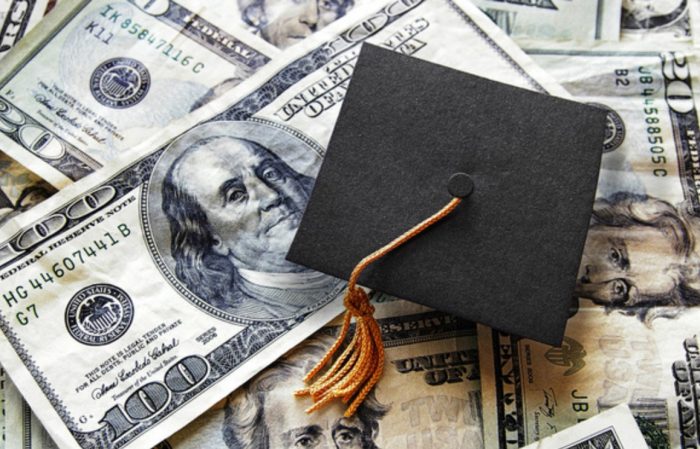
When we think about the highest categories of debt, our minds immediately think about credit card debt. Maybe we consider mortgages, car loans, or other types of big debt we have. This is the debt that challenged older generations; but this is a new time and a new generation. One of the lasting impacts of the recession back in 2008 is the rise of student loan debt as one of the fastest-growing categories of debt Americans face.
When the economy was hit, millions of people lost their jobs. Many of them figured the best thing to do was to get a degree and it might propel them to higher-paying work that’s less likely to get cut next time the economy goes down. Of course, when you’re not working, how do you pay for books and tuition? Student loans.
In fact, many colleges made promises of grandeur, saying if you went to their school, their job placement rates were 97% (or some arbitrary, made-up number). When these students graduated, they found out very quickly how fake the job placement numbers were. Saddled with tens of thousands in new debt, they came no closer to finding a job, much less one that was higher-paying. For attorneys like those at Babcock Injury Lawyers in Louisiana, this is an all too common concern for those entering the legal field.
As this continued to happen across the country, more Americans were going into default over their student loans. Even students who went to prestigious universities would graduate and be forced to settle for a job working the line at a fast-food restaurant. Making very little money, these Americans could barely afford their rent much less to keep their debt payments to stay current, only compounding the problem further.

A Study By J.P. Morgan Has Startling Results
JP Morgan just released a new study that found the impact of student loan debt on people. We often consider it a personal issue you deal with alone, but the new study found that to be untrue. Its reach goes beyond just the individual, but also into families who feel the need to work together to pay it off.
Currently, student debt is the fastest-growing type of household debt in America. The amount of student debt has reached $1.56 trillion, doubling its total in the last decade alone. This is causing many people and their families a lot of trouble. It’s also why many 2024 presidential candidates made it a priority to talk about student debt.
According to the study, 19% of the 44 million student loan borrowers receive help from family and friends. The problem is said to be so bad that “families are spending more on student loans than key categories of basic necessities,” the report said. It’s affecting everyone but hurts lower-income families the most.
The report revealed that lower-class people between the ages of 18-24 are spending a large portion of their budget on paying back student loans. This is forcing them to make a lot of tough decisions, even as they try to earn a living with their degree. They spend as much as 17% of their annual budget on student loans on average.

Families Feeling the Pressure
Of course, families are there to help each other. You want your child and/or grandchild to succeed, which is why they went to college in the first place. But many people sign on that dotted line to take out loans to do it. After they graduate, they’re forced to spend the next 10-20 years paying it off.
“By understanding the relationship between these student loan payments and other financial outcomes, we hope to provide policymakers, lenders and other stakeholders with valuable information that can help shape policies to ease this burden for America’s families,” Diana Farrell, President, and CEO of JPMorgan Chase Institute said in a previous statement.
The average amount Americans pay back each month toward their loans is $179. That’s only 5.5% of their monthly income, but many pay 11%. When you add on the increasing cost of rent and food, moreover the entire cost of living is going up, then you can see how this recurring debt is a problem. You don’t get a break from it until it’s completely paid off.
The report has revealed that only 44% of low-income people are able to keep up with their monthly bills. This is causing a massive crisis for many Americans who are just getting started out in life. Now we know that the burden is spreading to other family members who go out of their way to help.

The Perpetual Cycle of Debt for Personal Injury Attorneys
Student loan debt isn’t something you can get a reprieve from until it’s completely paid off. You can get a forbearance, but the interest continues to add up. If you simply refuse to pay it, it will still continue to grow. You can’t declare bankruptcy and have it removed from your profile. Being in default comes with another long list of complications, such as the inability to get a mortgage, car loan, and other problems.
This is why whole families are feeling the pressure. Parents feel like they need to help their kids. Grandparents are shelling out their savings. It’s putting a drain on the whole family structure. The cycle continues, adding interest to the point where paying the minimum balance rarely touches the principal.
Is there an opportunity for recourse? There just might be. Many students have been suing their school after word broke that they were defrauded. False advertising about their high job placement numbers is what got a lot of students in deep with their debt. There are student loan debt forgiveness opportunities out there in these instances.
The first step in determining whether or not you would qualify for student loan forgiveness is to contact a lawyer. If it is determined that you have been a victim of fraud, you could stand to have the entirety of your student loan debt wiped away. In some cases, you may find a reputable attorney who offers free consultations, so you won’t need to spend hundreds of dollars meeting with various debt lawyers.

Attending a top tier law school – or any law school at all – is a major achievement for the student and the family. But when that achievement comes at a great financial cost, it can feel like it was never worth the effort, or that you’ll never get the value you were promised from your degree. This is far from the case for every law student, but it has become common enough that there are now appropriate channels and resources for those in need of debt relief, both in and out of the student loan sector. If you need help with your student loan debt, reach out to an attorney or debt relief specialist.
















